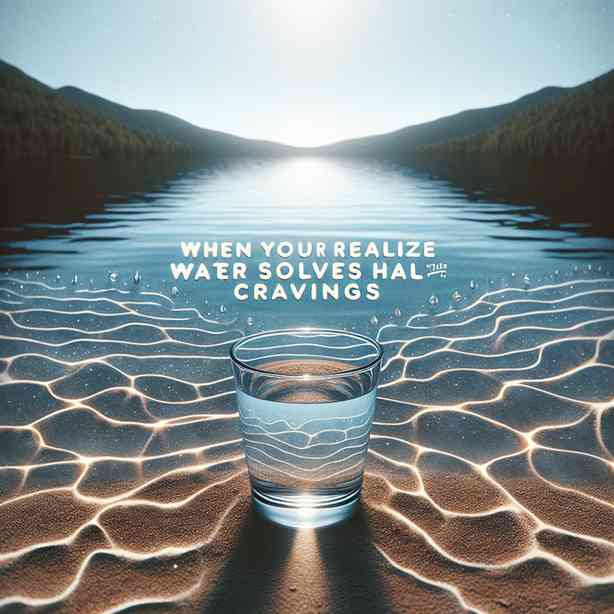
Cravings can be complex and overwhelming, often leading us to consume various snacks or meals that may not necessarily be good for our health. One often overlooked solution to these cravings is water. The simple act of hydrating can help alleviate feelings of hunger and reduce the desire for sugary or salty snacks. In this discussion, we will explore the relationship between thirst, hydration, and cravings, and how water can fine-tune our appetite and overall well-being.
Firstly, it is essential to recognize that our bodies sometimes send signals that can be misinterpreted. Thirst and hunger can manifest similarly; both might cause a rumbling in the stomach or a general sense of discomfort. In a busy lifestyle where hydration is often neglected, many people may feel hungry when, in reality, they may simply be dehydrated. By drinking a glass of water when cravings strike, one can often determine whether the body genuinely needs nutrition or is merely in need of hydration. This distinction can help prevent unnecessary snacking and overeating, fostering healthier eating habits in the long run.
Moreover, several studies have shown that drinking water can reduce appetite. When we consume water before meals, it can fill the stomach and send signals to the brain that we are full. This response reduces the likelihood of overeating, leading to better portion control and potentially encouraging weight loss. Studies suggest that individuals who drink around two cups of water before a meal consumed fewer calories as compared to those who did not hydrate beforehand. This simple hydration strategy highlights the effectiveness of using water as a tool against cravings.
In addition to curbing appetite, drinking water is vital for maintaining overall health. Our bodies are composed of approximately 60% water, and every cell functions optimally when hydrated. Dehydration can lead to fatigue, headaches, and confusion—all of which may exacerbate cravings for unhealthy snacks as a way to boost energy levels. By making a conscious effort to stay hydrated, one not only minimizes the risk of misinterpreting thirst for hunger but also promotes better physical and mental health.
Furthermore, water is a crucial component in the body’s metabolic processes. Proper hydration aids digestion, supports nutrient absorption, and encourages the efficient functioning of organs, including the kidneys and liver. When we are adequately hydrated, our bodies can regulate blood sugar levels more effectively. This is particularly important since fluctuating blood sugar levels can lead to increased cravings, especially for high-sugar foods. Thus, maintaining hydration is not just about satiating appetite; it is about ensuring that our body’s internal systems are working harmoniously to keep cravings at bay.
Incorporating water into your daily routine can also serve as a mindful practice. Taking a moment to drink a glass of water can be a chance to pause and reflect—an essential part of recognizing our body’s needs. Mindful eating encourages awareness of what we put in our bodies, allowing for better decision-making regarding food. Rather than reaching for a snack automatically, consider taking a moment to hydrate and assess genuine hunger levels. This practice can foster a healthier relationship with food and deepen awareness of emotional triggers that may lead to cravings.
In sum, water is an often underestimated solution for managing cravings. By being attentive to our hydration, we can mitigate the risks of misinterpreting thirst for hunger, reduce calorie intake, and promote a healthier lifestyle. Starting with simple changes, such as keeping a water bottle handy or setting reminders to drink, can create a significant impact over time. Remember, hydration plays a fundamental role in not only minimizing cravings but also supporting the body’s overall health. Embracing water as a solution may just be the first step toward a more balanced and mindful approach to eating.
Ultimately, realizing that water can solve half the cravings can profoundly transform our relationship with food and well-being. Each sip and each glass of water can not only quench our thirst but can also empower us to make healthier choices, leading us toward a more fulfilling and nutritious lifestyle. Therefore, the next time you feel a craving creeping in, consider reaching for that refreshing glass of water first. Your body will thank you for it!


